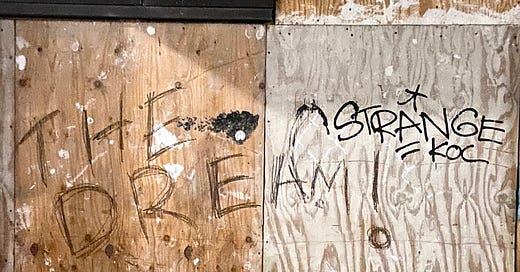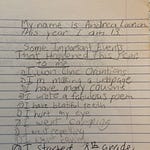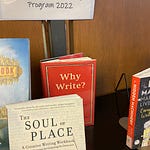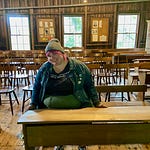Hey pals. I didn’t plan on taking off the month of March but sometimes that’s how it goes. Hope everyone was well in the meantime.
On Friday, I saw Angels in America Part One: Millennium Approaches at the Pittsburgh Playhouse and I haven’t been able to stop thinking about it since. I’ve been going to shows at the Playhouse for the last 15 years and this is easily one of their best productions. Highly recommend checking it out if you’re able (masks and vax cards required). It makes for a great return to the theater if you also haven’t seen anything live since 2019.
The thing about Angels is if you care about theater at all, you’re like, duh, of course it was amazing, it’s only the most groundbreaking play of the last 30 years, first major work to address the AIDS crisis, like nothing that had come before, blah blah. If you’re me, a girl growing up in an old coal town who thought she loved the ~theeeaaatooorr~ though her main exposure were the local high school musicals, encountering this play for the first time in Modern American Drama class elicited a major WTF. Why? Let me try to describe it:
Set in 1985, the play follows a gay man who contracts AIDS but his longtime boyfriend can’t deal and leaves him in a fit of shame. Meanwhile, the marriage between a closeted Mormon lawyer and his Valium-addicted wife also falls apart as she slips deeper into hallucinations and he grapples with his sexuality. Storylines overlap in both the real and metaphysical worlds, a fictionalized version of the lawyer Roy Cohn plays a major part, ‘80s Reaganomics is practically a character itself, the ghost of Ethel Rosenberg shows up, and after three hours, it ends with a giant angel busting through the scenery. Oh, and this is just part one. There’s a whole other play (Perestroika) to wrap things up.
So, no, not exactly what I would have caught down at the local community theater. Reading it in class, I struggled with the metaphors. The significance was lost on me. Watching the HBO mini-series helped (all plays are meant to be seen, not read, especially this one) and it is an excellent mini-series, but there’s a reason we still go to the theater. Nothing virtual can replace the living. All those Zoom happy hours are a testament to that.
This play is set the year I was born, so I was a small child in the early 90s when this was first performed. AIDS was an acronym that I heard around in the way that the news floats about your childhood orbit but doesn’t stick unless it affects your daily life. I honestly can’t remember how I came to understand what AIDS is. Cultural touchstones help us make sense of the world but I was too young for RENT, Magic Johnson’s retirement, and Pedro on The Real World. This explains why the importance of the play didn’t hit me hard in 2007. By that time, it had gone from a death sentence to a more manageable chronic condition (worth noting that as a white cis woman, I’m not in the demographic most effected by AIDS today). The anxiety of the first few months of the pandemic probably did more to help me understand the terror of that time, though this was only on a fraction of the scale.
It’s chilling how much Angels is still relevant today. To see this production as more states are looking to adapt their own versions of that horrible Florida law, as books are being pulled from library shelves, as LGBTQIA educators are targeted just for living their lives openly without shame, feels like an emotional whiplash. I know enough from history that there are always backlashes to any social progress but often everything feels so heavy and exhausting. Even just a few years ago, I wouldn’t think this is where we’d be, tethering on the edge of falling down a flight of stairs.
Despite the grief, there’s one word that best describes how I felt by the end: grateful. It’s great art and quite funny. I feel the same about sharing meals with the people I love. Good storytelling, good food, good company, it’s why we’re alive. There’s something holy about those experiences and I’ll never take them for granted again.
“What the Living Do”
Johnny, the kitchen sink has been clogged for days, some utensil probably fell down there.
And the Drano won't work but smells dangerous, and the crusty dishes have piled up
waiting for the plumber I still haven't called. This is the everyday we spoke of.
It's winter again: the sky's a deep, headstrong blue, and the sunlight pours through
the open living-room windows because the heat's on too high in here and I can't turn it off.
For weeks now, driving, or dropping a bag of groceries in the street, the bag breaking,
I've been thinking: This is what the living do. And yesterday, hurrying along those
wobbly bricks in the Cambridge sidewalk, spilling my coffee down my wrist and sleeve,
I thought it again, and again later, when buying a hairbrush: This is it.
Parking. Slamming the car door shut in the cold. What you called that yearning.
What you finally gave up. We want the spring to come and the winter to pass. We want
whoever to call or not call, a letter, a kiss — we want more and more and then more of it.
But there are moments, walking, when I catch a glimpse of myself in the window glass,
say, the window of the corner video store, and I'm gripped by a cherishing so deep
for my own blowing hair, chapped face, and unbuttoned coat that I'm speechless:
I am living. I remember you.
— Marie Howe
Thanks for taking the time to read this, it really means a lot. There are probably mistakes because I’m an extremely flawed person. Links to my website and social media can be found below. If you feel so obliged, you can buy me a cup of coffee here or here and I’d be very grateful. <3














Share this post